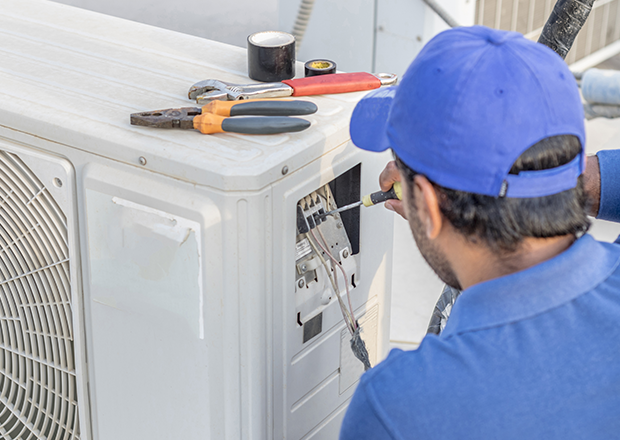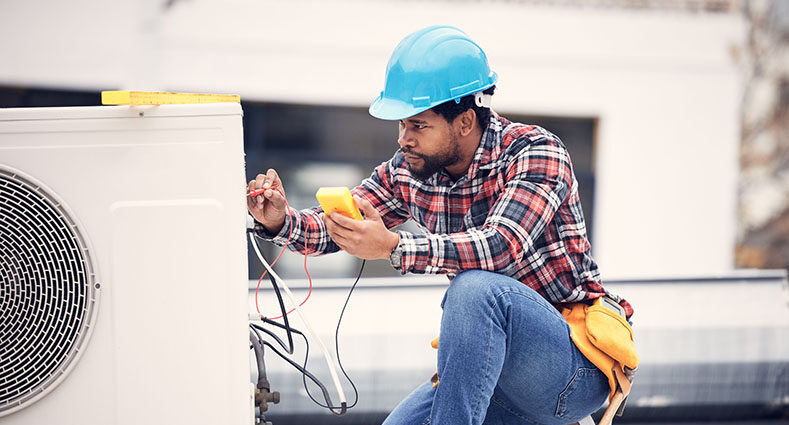Fix broken Air conditioner or replace it? How to decide
Wiki Article
Everything about Heating And Cooling: Identifying Common Issues and Effective Air Conditioning Repair Service Approaches
Cooling and heating systems are vital for maintaining interior convenience. Comprehending their components and capability is important for identifying common problems. Home owners commonly face problems such as ineffective cooling, odd smells, or rising energy expenses. These signs can show underlying concerns that may call for focus. Discovering do it yourself troubleshooting methods can be valuable, but recognizing when to look for professional help is similarly crucial. What steps can be taken to assure long-lasting efficiency?Recognizing Your A/c System: Components and Functionality
A HVAC system, often considered the backbone of indoor environment control, contains a number of crucial elements that collaborate to manage temperature level and air top quality. The key components consist of the home heating unit, air flow system, and cooling unit. The home heating system, usually a heater or boiler, produces heat during cooler months, while the air conditioning system cools down indoor rooms during the summer.
Typical Heating And Cooling Problems House Owners Encounter
Home owners typically face a number of typical heating and cooling issues, consisting of inconsistent temperature level circulation throughout their home. In addition, unusual noises during procedure can indicate underlying concerns that require interest. Attending to these issues without delay is vital for maintaining optimal system performance.Irregular Temperature Circulation
Several homes experience the irritating problem of irregular temperature circulation, where certain areas feel uncomfortably warm while others stay too cool. This issue usually arises from a variety of aspects, including bad insulation, blocked vents, or an incorrectly sized heating and cooling system. When ducts are not adequately sealed or when furniture obstructs air movement, some areas might get insufficient cooling. In addition, thermostat positioning can substantially impact temperature guideline; a thermostat situated in a sunlit area might misstate the total temperature of the home. Routine maintenance, including cleansing filters and making certain ductwork is clear, can assist alleviate these discrepancies. Homeowners might also take into consideration zoning systems to better control temperatures throughout various areas of the home, advertising a more comfortable living environment.Unusual Sounds During Procedure
When a cooling and heating system operates, unusual noises can indicate underlying concerns that need interest. Property owners may encounter a variety of noises, such as grinding, squeaking, or hissing. Grinding noises frequently signal damaged bearings or parts, while squeaking can suggest loosened belts or components needing lubrication. Hissing may show a cooling agent leak, which can compromise the system's performance. Furthermore, banging noises might indicate loosened ductwork or an issue with the blower follower. Each of these sounds functions as a caution, triggering property owners to explore further. Disregarding these signs can cause more substantial issues and costly fixings. Routine upkeep and prompt focus to unusual noises can boost system durability and performance, making certain a comfortable living setting.Indications That Indicate Your AC Needs Fixing
Exactly how can one inform if their air conditioning unit wants repair? Several indicators may suggest underlying concerns requiring expert attention. If the Air conditioner stops working to cool the room successfully, it might suggest a refrigerant leakage or compressor breakdown. Furthermore, a rise in energy bills without matching use changes could signify inefficiency in the system. Property owners should likewise look out to unusual scents rising from the unit, which might suggest mold development or electric concerns. Furthermore, if the AC regularly cycles on and off, it may be a sign of a malfunctioning thermostat or various other mechanical troubles. Ultimately, the visibility of water merging around the device can show a clogged up drainpipe line. Recognizing these signs early can conserve time and cash, making certain that the cooling system operates efficiently and efficiently.DIY Troubleshooting Techniques for HVAC Issues
When facing HVAC problems, house owners can utilize numerous do it yourself repairing methods to identify the trouble. Trick techniques include examining thermostat setups, checking air filters, and assessing drainage concerns. These steps can aid determine typical malfunctions prior to looking for professional aid.Examining Thermostat Setups
What steps should house owners take to guarantee their thermostat settings are appropriate? They must verify the thermostat is established to the preferred temperature level and mode, whether heating or air official statement conditioning. Checking for a clear display screen and confirming the thermostat is not established to "hold" or "getaway" mode is necessary. Homeowners need to additionally confirm that the thermostat is level and installed in an area devoid of drafts, straight sunshine, or various other temperature affects. In addition, altering the thermostat can aid give precise analyses. If the thermostat operates batteries, replacing them might settle any kind of issues. By methodically assessing these aspects, property owners can commonly identify and remedy thermostat-related troubles, promoting perfect heating and cooling system efficiency.Inspecting Air Filters
Air filters play an important function in keeping ideal a/c efficiency. They trap dirt, irritants, and other bits, making certain tidy air circulation. Gradually, filters can come to be clogged, decreasing air movement and effectiveness. To examine air filters, people need to initially locate the filter, frequently discovered in the return duct or near the heater. When situated, they should examine the filter's problem-- if it appears unclean or stained, it likely requirements substitute. The majority of filters require changing every 1-3 months, depending on usage and environmental aspects. Normal examination and prompt substitute of air filters not just boost air top quality yet additionally lengthen the life-span of heating and cooling systems, avoiding prospective malfunctions and pricey fixings.
Examining Drain Issues
Exactly how can house owners successfully determine and deal with drainage concerns within their a/c systems? First, they need to check the condensate drain line for clogs or clogs, which can lead to water buildup. Property owners may utilize a wet/dry vacuum to get rid of any type of particles obstructing the line. Next off, inspecting the drain pan for rust or leakages is important, as a damaged pan can cause water to overflow. Routine cleaning of the drainpipe line with a mix of vinegar and water aids stop future clogs. In addition, making certain appropriate incline of the drain line advertises effective water flow. If these do it yourself methods do not fix the concern, getting in touch with an expert HVAC service technician may be necessary to avoid possible water damage and system failing.When to Call a Specialist for Air Conditioning Repair Services

While some air conditioning problems can be handled via do it yourself approaches, there are situations where calling a specialist ends up being important. Home owners should seek skilled support when they run into consistent issues, such as inadequate cooling, odd sounds, or unusual smells originating from the system. These signs might suggest much deeper problems that require specialized knowledge and devices to detect and fix correctly.

Preventative Maintenance Tips for A/c Long Life
Normal preventative upkeep can greatly enhance the longevity of heating and cooling systems. Property owners must arrange annual assessments by licensed service technicians to examine system efficiency and identify potential concerns. Routinely changing or cleaning air filters is essential, as this guarantees correct air movement and lowers stress on the system. Additionally, checking and securing ductwork protects against power loss and enhances general performance.
It is additionally a good idea to maintain the outside system clear of particles and plants, allowing for peak air flow and warmth exchange. House owners should check the condensate drainpipe for obstructions to prevent water damage and mold and mildew development. Additionally, preserving proper thermostat settings and utilizing programmable options can improve power effectiveness. Ultimately, documenting upkeep tasks helps track service history and can help in identifying recurring issues (HVAC company). By following these preventative steps, people can maximize the performance and lifespan of their a/c systems
Regularly Asked Questions
How Commonly Should I Replace My HVAC System Filters?
A/c system filters should generally be changed every one to 3 months, depending upon usage, filter kind, and environmental aspects. Normal substitute assists maintain efficiency and air quality, guaranteeing peak system performance throughout the year.What Dimension HVAC System Do I Need for My Home?
To establish the appropriate heating and cooling system dimension for a home, one need to take into consideration square footage, insulation quality, and regional climate. Consulting an expert can aid assure optimal effectiveness and convenience for the certain living room.Exist Eco-Friendly Cooling And Heating Options Available?
Yes, eco-friendly heating and cooling choices are offered, including energy-efficient warm pumps, solar-powered systems, and geothermal heating. These options minimize power intake and ecological effect, advertising sustainability while preserving effective environment control for property and commercial rooms.Exactly How Can I Improve My cooling and heating System's Power Performance?
To improve HVAC power efficiency, one can consistently preserve the system, seal air leaks, set up programmable thermostats, use energy-efficient filters, and warranty sufficient insulation throughout the home to lower energy intake and boost efficiency.
What Is the Typical Life-span of a Cooling And Heating System?
The average lifespan of a HVAC system commonly varies from 15 to 25 years, relying on variables such as upkeep, use, and the top quality of setup. Routine upkeep can significantly prolong its operational longevity.Conclusion
In summary, a thorough understanding of HVAC systems empowers home owners to recognize usual problems and address minor problems properly. Identifying indications of malfunction, employing DIY troubleshooting strategies, and focusing on routine maintenance can boost system performance hvac heat pump and efficiency. When faced with intricate fixings, employing professional assistance is essential to assure safety and security and durability. By promoting recognition and aggressive care, people can take pleasure in a comfortable interior environment while decreasing unforeseen costs related to heating and cooling failings.Report this wiki page